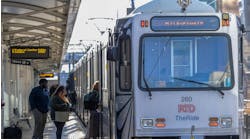Over 28 Million Bike Share Trips Were Taken in the U.S. in 2016
The National Association of City Transportation Officials (NACTO) has released the first-ever nationwide count of bike share rides in the United States. NACTO’s data shows that over 88 million trips have been taken on a bike share bike in the U.S. since 2010, when the first modern bike share systems in the country were established.
Bike share has grown to 55 systems across the country, with over 42,000 total bikes. This has meant that one of the lowest-cost transportation options is available to more people nationwide than ever before.
The five largest systems — Citi Bike in New York, Capital Bikeshare in Greater Washington DC, Citi Bike in Miami, Divvy in Chicago, and Hubway in Greater Boston — continue to build on their established success, generating 85% of the 28 million trips taken in 2016. This finding reinforces NACTO’s previous research demonstrating that bike share use increases exponentially with station density.
Most trips are short: 12 minutes on average for members of a bike share system. This indicates that most users use the systems to extend other transit options, and for point-to-point trips that may be too short for transit but too long to walk. This held true even with the new proliferation of smart bike systems (as opposed to smart dock), which generally allow for pickup and return of bikes in a larger and more flexible area.
In keeping with bike share’s advantages as a flexible, low-cost transportation system, many cities are focusing on ensuring that bike share is available to all members of a community, regardless of income level. 24% of systems nationwide have an income-based subsidy available, with rates as low as $5 per year.
“NACTO’s unique compilation of bike share's ‘vital stats’ gives cities and advocates alike a clearer understanding of the strengths and opportunities in this growing industry,” said Kate Fillin-Yeh, NACTO’s Bike Share program director. “By focusing on good system design and equitable ways to increase mobility, bike share systems are becoming an integral part of the transportation mix in cities across the country.”
"With Divvy serving almost two-thirds of the City’s population, Chicagoans have enthusiastically embraced bike-sharing. Divvy recorded more than 3.5 million trips in 2016, a 14 percent increase over the previous year. And we were excited to celebrate our ten millionth ride in January of this year," said Chicago Department of Transportation Commissioner Rebekah Scheinfeld. "We've not only invested in our bike share program—we've made it accessible to everyone with an extensive network of protected bike lanes, and an innovative subsidy program, Divvy for Everyone, that makes bike share a great option for Chicagoans at all income levels."
"Biking saves time and money, improves health outcomes, and increases access to opportunities," said Tracey Capers, executive vice president at Bedford-Stuyvesant Restoration, which has worked to break down barriers to bike share access in New York City. "With a concentrated focus on equity, long-time residents see what having bike share in their neighborhoods can mean for them, with positive outcomes on life's big challenges."


